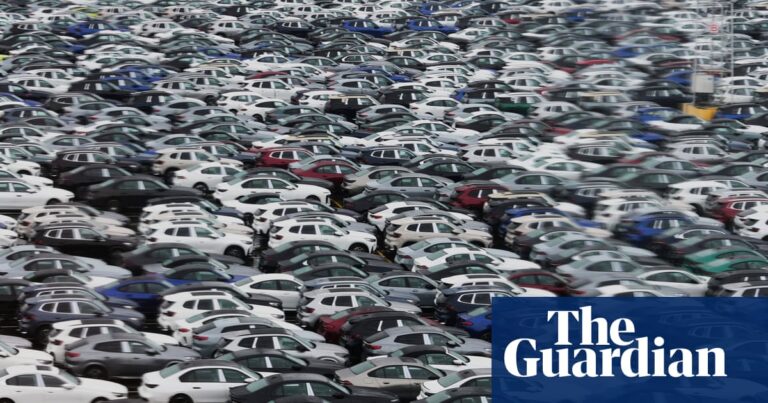Washington will not lower steep tariffs on European cars until Brussels has introduced legislation to reduce its own tariffs on US exports, maintaining pressure on the EU’s automotive industry.
While the Trump administration has agreed to lower the current 27.5% US tariffs on European cars and car parts to 15%, details of a framework trade deal published on Thursday revealed the terms and conditions.
Donald Trump and the president of the European Commission, Ursula von der Leyen, announced the deal on 27 July at Trump’s luxury golf course in Turnberry, Scotland, after an hour-long meeting that followed months of negotiations.
In a joint statement, the US and the EU listed commitments including the EU’s pledge to eliminate tariffs on all US industrial goods, and provide preferential market access for a wide range of US seafood and agricultural goods.
The US has agreed in principle to charge a 15% tariff on most EU imports, including autos, pharmaceuticals, semiconductors and lumber.
US officials have suggested it could only be a matter of weeks before the administration lowers its high tariffs on the EU auto industry, depending on how long it takes the bloc to formally legislate its pledges to pare back tariffs on the US.
“As soon as they’re able to introduce that legislation – and I don’t mean pass it and fully implement it, but really introduce it – then we will be in a position to provide that relief,” an unnamed US official told Reuters. “And I will say that both sides are very interested in moving quickly.”
But the joint statement makes clear that EU carmakers will continue to face 27.5% US tariffs until the bloc introduces new laws. US tariffs on EU cars will be lowered “from the first day of the same month in which the European Union’s legislative proposal is introduced”, it says, adding that the legislation must “be consistent with this Framework Agreement and enacted by the necessary legislatures”.
European leaders have some reservations. Last month the French prime minister, François Bayrou, described “a dark day when an alliance of free peoples, united to affirm their values and defend their interests, resolves to submission”.
And the Spanish prime minister, Pedro Sánchez, said at a news conference earlier this week: “I support this trade agreement, but I do so without any enthusiasm,” noting the deal would have a limited impact on Spain’s economy given its smaller exposure to the US market.
On Thursday, industry leadersresponded with dismay.
In 2024, the EU exported €8bn worth of alcohol, including €5bn of wine, to the US, its main export market. The French wine exporters federation said on Thursday it was “hugely disappointed” by the EU’s admission that it failed to secure a tariff exemption for the sector in the US-EU trade deal.
“We are certain that this will create major difficulties for the wines and spirits sector,” the head of the wine and spirits federation FEVS, Gabriel Picard, said.
France’s minister for trade, Laurent Saint-Martin, said the government would seek “additional exemptions” for wines and spirits as part of the US-EU trade deal. “The agreement leaves open the possibility for additional exemptions and we’ll be working on them. The story isn’t over,” he wrote on X, adding: “I’m not saying it will be easy or that it’ll happen next week … defending our exports remains our priority.”
Christophe Chateau of the Bordeaux winemakers association, said the US was his members’ biggest market and the tariff would be a “further brake” on sales. However, he said he was relieved Trump had not carried out threats to tax imports of European wine at 200%. “It could have been worse, but it’s not good news,” he added.
Before the announcement on Thursday, the Swiss chocolate makers Lindt and Swiss knife producers Victorinox announced they planned to move part of their production to the US to avoid tariffs on exports.
The Distilled Spirits Council of the United States also criticized the deal, noting 15% tariffs on EU spirit imports to the US could result in an estimated retail loss of more than $1bn and 12,000 jobs. “We are disappointed that this joint statement did not include permanent tariff-free trade for distilled spirits on both sides of the Atlantic,” its president and CEO, Chris Swonger, said in a statement.
Of the 27 EU member states, Germany exports most to the U.S. (€161bn last year) followed by Ireland (€71.3bn), Italy (€64.8bn), France (€47.1bn) and the Netherlands (€43.3bn) according to figures from the EU’s statistics agency Eurostat.
Last month, the Italian Employers’ Study Centre, warned a 15% rate combined with a 13.5% devaluation of the dollar against the euro in 2025 would cause a €22.6bnbillion decline in the country’s exports to the US.
“We are talking about 15%, but in reality the surcharge will be close to 30%,” Dario Costantini, president of the CNA (the national confederation of small and medium size businesses), said. “This is an unfair and disproportionate tax that penalises products made in Italy and will also have negative repercussions on the US economy.”
Reuters contributed reporting
